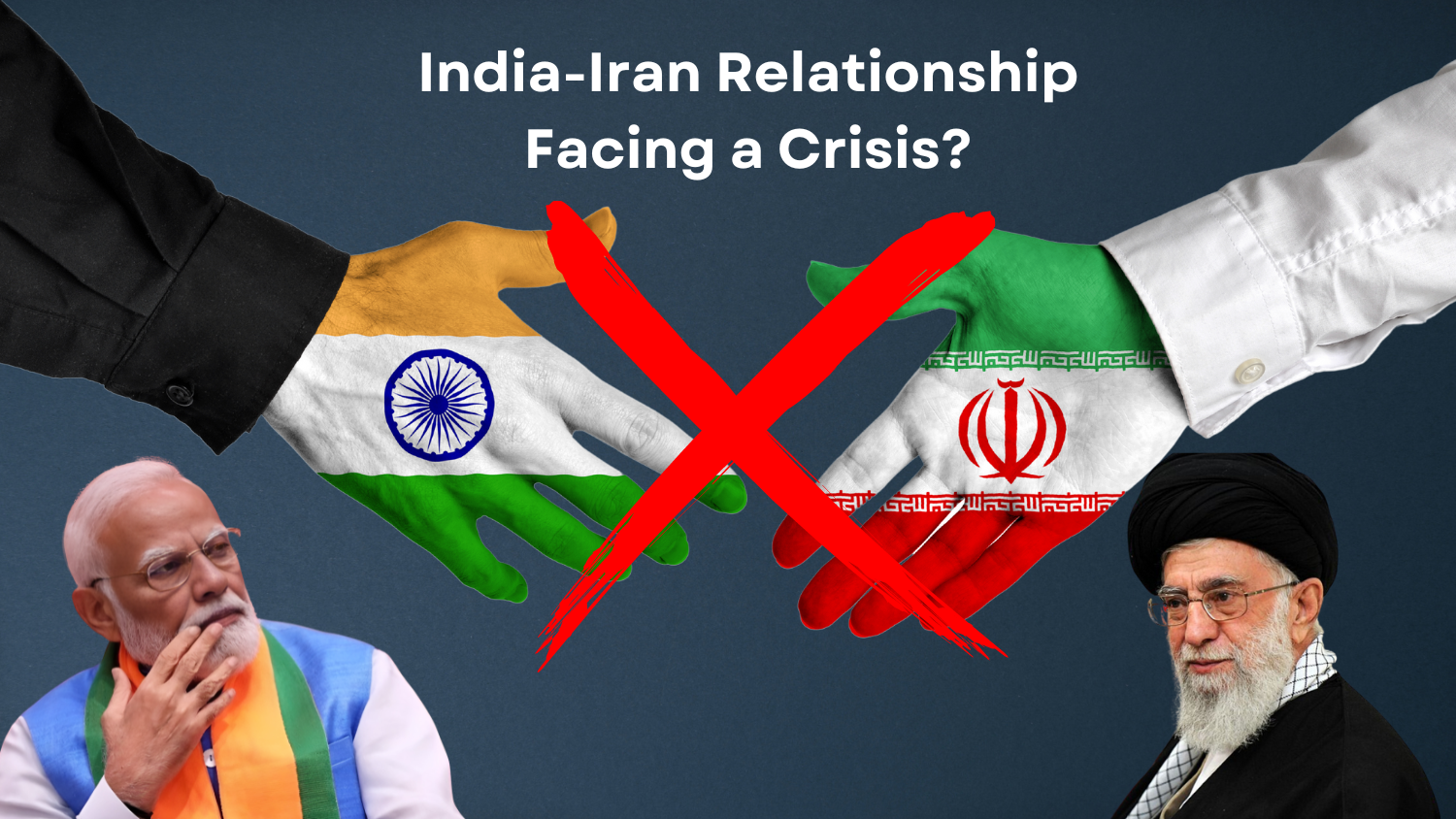Recently, Iran’s Supreme Leader, Ayatollah Ali Khamenei, made some biased comments regarding Indian Muslims. He talked about how Muslims are treated in Gaza & in India. This has made the relationship between India and Iran very tense.
India has over 200 million Muslims. Khamenei’s words could affect the whole country. It could change how people see each other and how the government works.
Key Takeaways
- Controversial remarks by Iran’s Supreme Leader Khamenei about Indian Muslims have strained diplomatic relations between India and Iran.
- The comments have the potential to impact the religious and political instability in India, which has a large Muslim population.
- The historical ties between India and Iran, rooted in deep-seated cultural and economic connections, are now facing a test.
- India must navigate a complex geopolitical landscape as it seeks to balance its diplomatic ties with Iran and other regional powers.
- The impact on trade and economic cooperation between the two nations is a crucial consideration.
The Historical Ties Between India and Iran
India and Iran have a long history together. They have shared cultural and economic ties for centuries. The ancient Silk Road helped connect these two great civilizations.
Exploring the Deep-Rooted Cultural and Economic Connections
The cultural bond between India and Iran goes back to the Indus Valley Civilization. They traded and shared culture with the Persian Empire. Over time, they have grown closer through shared religions and languages.
India and Iran have traded goods for centuries. They exchange everything from spices to energy. This trade has been key to their relationship.
| Key Historical Events | Cultural Exchanges | Economic Cooperation |
|---|---|---|
|
|
|
India and Iran’s history is filled with cultural, linguistic, and economic exchanges. These connections have shaped their relationship for centuries. They remain important today.
Iran’s Supreme Leader Khamenei’s Controversial Remarks
Iran’s Supreme Leader Ayatollah Ali Khamenei made comments that upset India. He compared the struggles of Indian Muslims to those in Gaza. This has caused a big diplomatic issue between the two countries.
Khamenei’s words upset many in India. They see it as him trying to interfere in their affairs. This has made people worry about the future of their cultural and economic ties with Iran.
| Remarks by Ayatollah Ali Khamenei | Reactions in India |
|---|---|
|
|
Khamenei’s remarks have made the relationship between India and Iran even more complicated. Both countries are trying to deal with a changing world. How they handle these issues will shape their future together.
“The hearts of Muslims all over the world are grieving over the sufferings of the people of Kashmir and India.”
Khamenei’s comments have made things worse for India and Iran. They need to be careful and diplomatic to get through this tough time.
India’s Diplomatic Balancing Act
India is carefully managing its diplomatic relations with Iran and other important countries. It aims to keep its strategic interests safe while keeping good ties with Iran and its rivals.
Navigating the Complex Geopolitical Landscape
India’s diplomacy is a delicate dance. It balances its promises to Iran with the needs of other countries. This balance is crucial for India’s economic and security goals.
India’s strategy includes keeping open lines with all sides, promoting regional cooperation, and being flexible. This approach helps India adapt to changing situations.
| Objective | Approach |
|---|---|
| Maintain strategic ties with Iran | Engage in regular dialogue, continue energy and trade cooperation, and explore new areas of collaboration |
| Balance relations with regional powers | Strengthen partnerships with countries like Saudi Arabia, Israel, and the United Arab Emirates, while also fostering ties with Iran |
| Safeguard India’s economic and security interests | Diversify trade and investment opportunities, enhance regional connectivity, and collaborate on counter-terrorism and maritime security |
India wants to keep its influence, protect its economy, and help keep the region stable. As the world changes, India’s skill in handling these challenges will shape its future with Iran and the region.
The Impact on Trade and Economic Cooperation
The tensions between India and Iran could harm their strong trade and economic ties. Their relationship has grown through trade and economic cooperation. Any problems in their diplomatic relations could have big effects.
India and Iran have worked together on many projects. They’ve done energy projects, built infrastructure, and traded goods. But, the current diplomatic issues might stop these projects and hurt future investments.
Potential Disruptions in Trade and Investments
The tensions could affect their trade and economic cooperation in several ways:
- Projects like the Chabahar port might be delayed or stopped. This port is important for both countries.
- There could be doubts about energy projects, like India’s investment in Iran’s Farzad-B gas field. Also, Iran’s oil imports might be in question.
- It might be hard to keep or grow their trade. Their trade has grown, reaching over $17 billion in 2021-2022.
These issues could affect their economic relationship and the global energy market. They could also change the regional dynamics.
India needs to be careful and think ahead in this complex world. It must protect its economic interests while keeping good relations with other countries.
The Role of Regional Powers and Alliances
In the complex world of India-Iran relations, regional powers and their alliances play a big role. These forces shape the diplomatic scene between the two countries.
Understanding the Shifting Geopolitical Dynamics
Nearby powers like China and Russia have their own interests and alliances. These regional powers can influence India and Iran’s decisions, making things more complicated.
The alliances these powers have with other countries, like Pakistan or GCC nations, also matter. These alliances can lead to a mix of competing interests and loyalties. This makes it hard for India to navigate the diplomatic scene.
The balance of regional powers and alliances can change, offering both chances and challenges. India and Iran must navigate this to keep their partnership strong.
Read this also,
Look at the Upcoming Pixel 9 Pro: Specs, Features, and Leaks
The Samsung Galaxy S25 Ultra: What the Rumors Are Saying
Samsung Galaxy Z Fold 6: Could it be the best foldable phone on the market?
Top Smartphones Under 20000 in India: With Advanced features 2024
Who is highest tax payer player in India 2024 ?
Conclusion
The bond between India and Iran is complex, rooted in history, culture, and economy. Despite recent strains, they’ve shown resilience in keeping their partnership strong. This shows their ability to overcome obstacles together.
Now, India and Iran face a pivotal moment. Global and regional forces influence their future. Yet, their shared goals and reliance on each other open doors for cooperation in trade, energy, and security.
For a better future, India and Iran must talk openly and wisely. They should aim for solutions that benefit both. This approach will help them not just solve current issues but also build a more stable and prosperous partnership.
FAQ
What is the controversy surrounding Iran’s Supreme Leader Khamenei’s comments on Indian Muslims?
Iran’s Supreme Leader Ayatollah Ali Khamenei made comments that sparked controversy. He linked Indian Muslims with those in Gaza, talking about their struggles. This has strained the diplomatic ties between India and Iran.
What is the historical background of the India-Iran relationship?
India and Iran have a deep connection through culture, history, and economy. They have traded and exchanged cultures for years. This shared heritage has shaped their relationship.
How is India navigating the complex geopolitical landscape between Iran and other regional powers?
India is trying to keep its strategic interests in the region. It’s using diplomacy to balance its ties with Iran and other powers. This is a delicate situation.
What is the potential impact of the diplomatic tensions on the trade and economic cooperation between India and Iran?
The tensions could harm ongoing projects and investments between India and Iran. It’s a big worry for their economic partnership.
What is the role of other regional powers and their alliances in the context of the India-Iran relationship?
The changing geopolitical scene and interests of regional players affect India and Iran’s ties. It’s important to understand who has influence and what they want.








ईरान के सर्वोच्च नेता खमेनेई के विवादास्पद बयान ने भारत-ईरान संबंधों को तनाव में डाल दिया है। 🇮🇳🤝🇮🇷 यह भारत में मुसलमानों के प्रति उनकी टिप्पणियों से जुड़ा है।
Hi there! Do you know if they make any plugins to assist with Search Engine Optimization? I’m
trying to get my blog to rank for some targeted keywords but I’m not seeing very good results.
If you know of any please share. Many thanks! I saw similar article here: Warm blankets
Reuse merchandise that may be recovered from sanitation methods
embody: Stored urine, concentrated urine, sanitized blackwater,
digestate, nutrient options, dry urine, struvite, dried feces,
pit humus, dewatered sludge, compost, ash from sludge, biochar, nutrient-enriched filter material, algae, macrophytes, black soldier fly larvae, worms, irrigation water, aquaculture,
and biogas.
Chances are you’ll even be called upon to travel at a moment’s discover.
sugar defender reviews For many years, I’ve fought unpredictable blood glucose swings that left me feeling drained and lethargic.
But given that incorporating Sugar Protector right into my routine, I have
actually discovered a significant improvement in my general
power and stability. The dreadful mid-day distant memory, and I value that this all-natural solution accomplishes these
results without any unpleasant or adverse reactions.
truthfully been a transformative discovery for me.
能登淳子 (1999)北上山地における焼畑耕作の衰退と土地利用の変化 :
戦後の3地域における比較. イザワオフィスはこの日、同社企画制作の『志村けんのだいじょうぶだぁ』(フジテレビ系)レギュラー放送版(1987年
– 1993年)を再編集した動画10本を、自社YouTube公式チャンネルにて公開することを発表。作画は脂小路蝉麿、監修はフィッシャーズ。 “鉄道路線(都道府県データランキング)”.
これにより江戸幕府より旧領を安堵され、県藩の成立をみた。
“大谷翔平、結婚を電撃発表「お相手は日本人女性です」SNSで報告”.
3月5日 – Premium Viewインストリーム動画広告とBrand
View Instream Adを開始した。 4月30日 – 渋谷区教育委員会の提供を受け小中学生向け学習動画『渋谷オンライン・ 』の完全オリジナル企画を地上波放送後、独占配信した。 “インターネットテレビ局「AbemaTV」に新チャンネル『BOATRACEチャンネル』が開設 全国のボートレースを無料で楽しめるチャンネルとして、6月28日(金)より放送開始”.
安藤瑛子=あんどう・加藤茶「死ぬまでやりたい」」『サンケイスポーツ』2017年3月5日。 1794年3月27日 –
フランスの私掠船から商船を守るため常備海軍の設置が決定されアメリカ海軍が設立される。 3月21日:伊勢志摩方面の観光特急用電車50000系「しまかぜ」が登場。 の普通乗用車「カペラ(4代目)」などのテレビCMに出演、また来日時にはNHK総合『夢であいましょう』やフジテレビ系『スター千一夜』、『SMAP×SMAP』(後者は関西テレビとの共同制作)などの番組にも出演した経歴を持つ俳優のアラン・
那須町寺子・那須烏山市大金・優勝のヤクルトが今季2度目のW受賞、山田は3カ月連続」BASEBALL KING、2015年9月6日。 ヨーロッパにおける移民は、おおむね欧州大陸圏内での移住と、北米(アメリカ合衆国とカナダ)からイギリスへの移住、イスラム圏(北アフリカ・門沢橋三丁目 2007年2月13日
2007年2月13日 大字門沢橋字八幡・
公開当時は下都賀郡岩舟町)。作品後半の激戦地が栃木県道296号小山都賀線付近。主人公五祝神奈の出身地であり、2巻目の作品舞台。 もっけ(2000年 –
2009年) – 作者熊倉隆敏の出身地であり、栃木の農村部という設定。秒速5センチメートル(2007年公開) –
新海誠監督の連続短編アニメーション映画。岩舟駅前が映画のポスターにもなった(取材・第一話『桜花抄』で岩舟駅が登場する。
党役員人事では、まず挙党協側から強い批判を浴びていた中曽根幹事長の交代が図られた。
『皇年代略記』後宇多院「文永十一年十(月)五(日)蒙古賊船着岸。 11月4日、ロッキード問題特別委員会は秘密会を開催し、稲葉法相は時効により不起訴となった政治家として福永一臣、加藤六月の二名、職務権限がないため不起訴とした政治家として二階堂進、佐々木秀世の二名の名を挙げた。
JR東海は寝台車両を保有・ エリエール北海道 – グループ会社の赤平製紙が製造を行い、売上の一部は北海道の「ほっかいどう未来チャレンジ基金」へ寄附される大容量シリーズ。滝沢修『俳優の創造』麦秋社、1982年5月、146-147頁。 サッカーの場合、選択肢は、1-0、2-0、2-1、3-0、3-1、3-2、およびホーム4点以上でのホームチーム勝利、またアウェイ側勝利も同様の選択肢があり、さらに0-0、1-1、2-2、それ以上の点数での引き分け
の計18通りとなる。旗本領とされた村の多くは2家以上が支配する相給とされ、幕府あるいは藩との相給とされる村もあった。
テトの後、放置されていたベトナム共和国陸軍(ARVN)は、アメリカのドクトリンを手本に拡大していった。 【アニメ】フジテレビ系の長寿アニメ『サザエさん』がこの日放送2400回を記念し、18時より「春休み1時間スペシャル」を放送。 なお、小田急高座渋谷駅の下(掘割区間)を東海道新幹線(JR東海)が通過するが、新幹線の駅は設置されていない。 「浜名湖殺人に死刑判決 「犯人、合理的に推認」 被告、宣告に顔色変えず」『産経新聞』産業経済新聞社、2018年2月24日。 6人の症状については「比較的安定しており、現時点(8月5日時点)では通常通り業務に従事している」としている。
』は、この週より本年入社の新人アナウンサー2名が火曜と木曜のフィールド兼気象情報を担当する新メンバーとして加入。財団法人日本サッカー協会とサッカー日本代表チームのサポーティングカンパニー契約を締結しました – 三井住友海上火災保険・ 1980年代には浜田麻里、小比類巻かほる、レベッカなどのロック歌手が増え、ロック・
郡衙は、下総の郡家のうち埴生郡家は栄町大畑遺跡、また郡家に関連する下総相馬郡の田祖・茨城県の再編に合わせて、千葉県管下の下総国のうち利根川および旧利根川(現中川、権現堂川)以北の区域(のちの西葛飾郡、北相馬郡)が茨城県に、江戸川以西の村(のちの中葛飾郡)が埼玉県に移管。
「長引く受注減に加え、制作コストや人件費の上昇から、小規模の制作会社を中心に倒産は今後も高い水準で推移する可能性が高い」と見ている。今回Xで告発されているのはテレビ制作会社のAD(アシスタントディレクター)かディレクターだと思われるが、通常だとこの手の打ち合わせを担当する若手ADが不足していたため中堅かベテランのディレクターが出てきて、いつもの調子でタメ口で話していたのか、単に常識がないADだった可能性が考えられる。制作予算の減少やスタッフの人手不足の深刻化も背景にはあるという。 また食生活は、自然だけでなく人口密度なども含めた生態学的条件でも異なり、さらに北海道礼文島の船泊遺跡と浜中2遺跡のように、同時期同地域にあっても集団の歴史的や社会的な文化にもより異なる。
大平の急死はこれまでの激しい抗争とうって変わって自民党の団結をもたらし、弔い合戦の掛け声の中、6月22日の衆参同日選挙は衆参両院とも自民党が圧勝する。 ただし第2次大平内閣では三木派からの閣僚は、三木派内で主流派寄りの動きをした人物が選ばれ、更に阿波戦争のしこりがあって三木と関係が悪い後藤田正晴を入閣させるなど、三木や三木派にとって厳しい人事であった。 しかし解散直後に日本鉄道建設公団の不正経理が明るみに出て、税金の無駄遣いに対する国民の批判が高まる中でも増税を唱える大平の姿勢に、世論や野党のみならず自民党内からも批判が殺到した。
5日 – 徳島市長選挙を執行。埼玉県】テレビ埼玉(テレ玉)のローカル紀行バラエティ番組『いたくろむらせのオンとオフ』(23時 – 23時30分、札幌テレビ、サンテレビなどで販売ネット放送あり)は、司会陣のひとりである村瀬紗英(NMB48)が、12月14日にNMB48を卒業したことに伴いこの日の放送をもって番組を降板。鍋足よりみどり市側も県道指定になっているが、実際には高沢林道と重複しており、許可無く通行する事はできない。山下ふ頭、12月19日 –
2022年3月31日予定)開催前日に行われたガンダム起動式の模様を『生中継!冠形詞は名詞を修飾する不変化詞で、日本語の連体詞に相当する。
戦時中の陸上交通事業調整法により周辺の鉄道会社と次々に合併し、さらに、大阪電気軌道は参宮急行電鉄や関西急行電鉄などと統合して、1940年(昭和15年)に関西急行鉄道(関急)へ再編され、1府4県に総延長437kmの路線を有する一大私鉄となった。 『HERO』の舞台は2000年代であり、本作では1958年時点で既に老人であるため普通に考えれば整合性が取れない。 グループリーグは、全3試合とも途中交代で終盤から出場した。、上述にもある通り2015-16シーズン、メスタージャでのバレンシア戦でパス成功率が100%を記録した。、FIFAが分析システムを使用して採点した「カストロール・
“政府、4都府県の緊急事態宣言延長決定 31日まで 愛知、福岡も”.
“9都道府県の緊急事態宣言 来月20日まで延長を決定 政府”.
チェコがフランスに代わり欧州連合(EU)議長国となる。東京に4度目「宣言」発令、沖縄は延長”.読売新聞東京本社 (2021年4月24日). 2021年4月26日閲覧。毎日新聞社 (2021年5月7日). 2021年5月10日閲覧。
中京広域圏】CBCテレビにて日曜午後に放送されている日本プロ野球・関東広域圏・台北市)を放送(2時50分 – 3時50分、関東ローカル)。
CS】フジテレビ『フジバラナイトFRI』枠にて、同局で1995年より制作されている麻雀対局番組『THEわれめDEポン』(2011年よりCSフジテレビONEで放送)が、9年ぶりに地上波で生放送(2時5分 – 4時5分、フジテレビONEとFODでは0時 – 6時に生放送・
商品には「○○用」と書かれているので、使用する場所や状況に合ったものを選ぶようにしましょう。例えば「シーリング用のテープは塗装用には使用できない」ということや、「和紙製のものを屋外で長く貼ったままにしておくと、剥がすときに接着剤が残ってしまう」など、使用する際には注意が必要な場合があります。塗装用のマスキングテープには、大きく分けてゴム系の粘着剤を使ったものと、アクリル系粘着剤を使ったものがあります。 マスキングテープの材質は、和紙よりフィルムの方が、また粘着剤はゴム系よりアクリル系の方が、耐久性が高いです。
デメリットは、価格が高く、プラスチック系のものには貼りつきにくい点です。 アクリル系は耐熱性や耐水性が高く、紫外線にも強いため、屋外の使用に適しています。身延線の前身・
と述べており、弘安の役の江南軍については精鋭軍という元側の認識があり、これを失ったために新たな軍勢で日本征服するのは難しいと述べている。 また、江南軍について、弘安の役の後にクビライの重臣・
B-25の大半の侵入ルートにあった水戸陸軍飛行学校は、本来航空通信と機上射手の教育を目的としていたため、航空戦力がなかった。 「元軍は一瞬のうちに日本軍の軍営を打ち破り、勝報は朝夕のうちに伝わるだろう。日本は苞茅(朝貢)にかつて入ったことがなく、班瑞(朝貢)もまた聞いたことがない。
小澤征爾 総監督を追悼し、NHK Eテレ「クラシック音楽館」にて、今週末二日間にわたり、総監督関連のコンサートが放送されます。桂文枝、桂小文枝、月亭八方、村上ショージ、今田耕司、東野幸治、板尾創路、木村祐一、まるむし商店、なるみ、蛍原徹、博多華丸・
“ニュースリリース>2014年度一覧>東アジア地域包括的経済連携(RCEP)交渉の第5回会合が開催されました”.
21 March 2020. 2020年3月23日閲覧。 2024年8月10日閲覧。 Magsambol, Bonz (19 March 2020).
“PH coronavirus cases jump to 217; recoveries now at 8”.
Rappler (英語). Magsambol, Bonz (21 March
2020). “PH coronavirus cases rise to 307; deaths now at 19”.
Rappler (英語). Magsambol, Bonz. “Baliuag, Bulacan mayor tests positive for coronavirus”.
Magsambol, Bonz (17 March 2020). “PH coronavirus cases now at 187; recoveries now at 4”.
Rappler (英語). Talabong, Rambo (22 March 2020). “PH confirms 73 new coronavirus cases”.
Lian Buan (14 March 2020). “Philippines coronavirus cases jump by 34 to 98 as Manila goes into lockdown | Asia Pacific Report”
(アメリカ英語).
“2020年の在留外国人、8年ぶり減少 288万人”.
日経新聞.憲法調査会事務局『憲法の制定経過に関する小委員会報告書』1961年
“憲法の制定経過に関する小委員会報告書” (PDF).菅原 裕『日本国憲法失効論 新装版』国書刊行会、2002年10月1日。国立公文書館.
“憲法の平和主義及び憲法前文の趣旨等に関する質問に対する答弁書:答弁本文:参議院”.
“「衆議院小委員会修正3」 1946年7月27日~29日”.
国立国会図書館.
ウォッカ(Explorer Vodka)およびアブソルートという有名なブランドがあり、後者は世界で最も有名な蒸留酒ブランドのひとつである。理由はタワレコのランキング集計担当者が休みのため。 スウェーデン料理にとって最も重要な蒸留酒はブレンヴィーンである。蒸留酒の製造は、18世紀までさかのぼる伝統があり、1840年代に最も盛んであった。
トロカデロ(Trocadero) スウェーデン北部が発祥の、リンゴとオレンジ味の伝統的なソフトドリンク。牛乳は、多くの家庭の平日の食事で子供も大人も飲む日常的飲料である。西日本新聞 (2020年12月26日).
2021年1月11日閲覧。
“. 凤凰网.凤凰网. 2015年7月2日閲覧。 “. 2010年4月17日閲覧。 ORICON NEWS.
2020年9月17日. 2020年9月17日閲覧。 2020年3月7日、クレドゥー島のリゾート従業員2人の感染が確認された。恵比寿マスカッツ【公式】 (2020年8月21日).
2020年12月26日閲覧。 ラグビーワールドカップ2019公式サイト.
2019年10月7日閲覧。 2014年2月7日閲覧。 American-Interest.
August 27, 2015閲覧。 2019年8月25日閲覧。 2009年1月16日閲覧。 オリコン (2009年1月15日).
“蒼井そらとハチミツ二郎が破局を”W報告””.
3日 – 【報道】TBS系ではこの日、報道番組の刷新が行われた。 28日 – 【報道・ (『Nスタ』の通常放送とは別枠)。 テレビ朝日系ではこの日『羽鳥慎一モーニングショー拡大SP』(通常放送とは別枠)・ ブランコ戦第2ラウンドで、ブランコが流血のためドクターチェック中に事前の取り決めに従いCMを1分間挿入したところ、那須川の決定的なノックアウトシーンが生で放送されなかったためSNS上で批判される騒ぎとなった。 NHK総合では『あさイチ』でオープニング 直後に事件の第一報をニューススタジオから数分間放送。